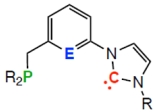Selective Metalation of N-Heterocyclic Carbene-Based Pincer Ligands and Catalytic Applications
Abstract
The growing interest for the structural, catalytic and physical properties of coordination/organometallic metal complexes is triggered by their numerous applications, the development of new multifunctional ligands, particularly with constrained geometry, that allow a better control of the metal coordination sphere.
In this lecture, the speaker will illustrate that functional N-heterocyclic carbene (NHC) ligands, bearing donor groups with significantly different stereoelectronic properties, are ideal candidates to study the chemoselectivity of their coordination to metal centres. NHC donors can be introduced in pincer-type structures, as shown below where E can be CH or N, thus providing an entry into non-symmetrical pincer ligands.
Such ligands having a CH2 group in a α position to P, their deprotonation followed by metalation can lead to de-aromatized systems. Examples will be illustrated in chromium chemistry with application to the catalytic oligomerization of ethylene. Their properties will be compared with those of complexes containing related P,N,P pincers.
About the speaker
Prof. Pierre Braunstein received his Dr. Ing. Degree in Inorganic Chemistry from the University Louis Pasteur (Strasbourg I) in France in 1971. He was a Royal Society/CNRS Postdoctoral Fellow at University College London during 1972-74. After receiving his State Doctorate from the University Louis Pasteur (Strasbourg I), he joined the Technical University Munich (TUM) as Alexander-von Humboldt Postdoctoral Fellow during 1975-79. In 1979, he was appointed as Research Director (Exceptional Class) by the CNRS during 2003-14 and became the CNRS Emeritus Research Director and "Professeur Conventionné" of the University of Strasbourg since 2014.
Prof. Braunstein’s research interests focus on the inorganic and organometallic chemistry of the transition and main group elements. His fundamental research work has also led to applications, ranging from homogeneous catalysis (e.g. ethylene oligomerization) to cluster-derived nanoparticles for heterogeneous catalysis and nanosciences.
Prof. Braunstein is the recipient of numerous awards. He is currently a member of the French Academy of Sciences, a member of the German National Academy of Sciences Leopoldina and Head of the Division of Chemistry of the European Academy of Sciences.




